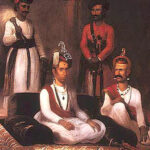The old Brahmin, traced the ancient sandstone walls of Chittor as he walked the ramparts in the pre-dawn light. His weathered face, marked by decades of diplomatic intrigue, betrayed no emotion as he watched Delhi’s armies slumber below. Sultan Alauddin Khilji’s siege had lasted three months now, exactly as planned.
“The pieces move as they must,” he whispered to his protégé, the young spymaster Jayant. The boy had proven himself invaluable, his network of informants stretching from Delhi’s bustling streets to the distant Mongol camps.
“Master,” Jayant hesitated, “Malik Kafur leads their eastern flank now. They say he’s Khilji’s most trusted general.”
Vidyasagar’s eyes narrowed. Malik Kafur’s reputation for brilliant strategy was well-earned. A former slave who had risen to become Khilji’s right hand, he represented everything unpredictable about the Sultan’s new order.
Inside the fortress’s war chamber, Queen Padmini sat with her generals, her face illuminated by flickering oil lamps. She sat quietly, her legendary beauty both a gift and a curse, unaware that she had become the centerpiece of her husband’s desperate gambit. Beside her stood Rawal Ratan Singh, his face bearing the scars of countless battles, his eyes holding secrets he would never share with his queen.
“The Sultan’s spies eagerly devour our tales,” Jayant reported to Ratan Singh in private, away from Padmini’s chambers. “Stories of her beauty spread through Delhi’s bazaars. Khilji can think of little else.”
Gora and Badal, the king’s loyal chieftains, exchanged knowing glances. They had orchestrated dozens of raids to spread these tales, each story more enchanting than the last, while keeping their queen ignorant of how her reputation was being wielded as a weapon.
“And our friends from the steppes?” Ratan Singh asked, his conscience heavy with the knowledge of how he was using his own wife as bait in this deadly game.
“Qutlugh Khwaja leads them himself,” answered Gora. “Forty thousand Mongol horsemen await our signal.”
In his own tent, Alauddin Khilji sat awake, studying his maps. Twenty years of conquest had taught him to read between the lines, to see the shadows behind the obvious. Beside him, Malik Kafur’s sharp features were illuminated by candlelight as he decoded intercepted messages.
“They think me a fool led by desire,” Khilji mused, his fingers tracing the route between Delhi and Chittor, then north to the Mongol territories. Despite his reputation for passion and impulsiveness, his eyes held the calculated look of a chess master.
“Let them think so, my Sultan,” Kafur replied with a thin smile. “While they plot with the Mongols, our own network grows.”
“And what does Zafar Khan say?” Khilji asked, referring to his most experienced general. Zafar Khan had earned his reputation defending Delhi against multiple Mongol invasions, his tactical brilliance matched only by his personal courage.
“He agrees with our assessment,” Kafur responded. “But he warns that we must maintain strong cavalry reserves. The Mongols will try to draw out our forces with feigned retreats – it’s their favorite tactic.”
“Zafar knows their methods well,” Khilji nodded. “He has faced them enough times. Have him coordinate with Nusrat Khan – Delhi’s walls have been strengthened beyond anything Qutlugh Khwaja expects, but Zafar’s mobile defense will be crucial.”
The complexity of the game delighted Khilji. His reputation for being driven by beauty and conquest served him well – few suspected the subtle mind behind the warrior’s exterior.
Within Chittor, the web of intrigue grew denser. Maharaj Kumar, the crown prince, argued fiercely with his father Ratan Singh about the risks of their strategy. “The Mongols cannot be trusted! What if they decide to keep Delhi for themselves?”
But the old king held firm. “Better the devil we don’t know than the one at our gates,” he responded, though doubt flickered in his eyes.
Meanwhile, in the women’s quarters, Padmini sat with her handmaidens, including the seemingly innocent Lakshmi, who secretly reported everything to Ratan Singh. The queen’s every move, every appearance was choreographed without her knowledge, each glimpse of her carefully planned to fuel the stories that would reach Khilji’s ears. She remained unaware that her own handmaiden was part of the elaborate deception.
When Khilji’s messenger arrived with the proposal – a simple request to glimpse Padmini’s reflection in a mirror – the trap seemed to spring perfectly. The Brahmin advisers exchanged knowing glances. But in the shadows, Malik Kafur’s own spies watched and waited.
The day of the mirror viewing brought together all the players in this great game. As Khilji climbed to the highest tower, each step was watched by dozens of eyes. Padmini had positioned her most trusted guards, disguised as servants, throughout the path. But Khilji’s seemingly lovesick gaze missed nothing – every defensive position, every hidden passage noted and memorized.
In the weeks that followed, the siege became a deadly dance of feints and counter-feints. When the Mongols finally struck at Delhi, they found themselves facing a perfectly coordinated defense. While Nusrat Khan’s fortifications held firm, it was Zafar Khan’s brilliant cavalry maneuvers that broke the Mongol advance. His forces refused to fall for their feigned retreat tactics, instead using his own version of their hit-and-run strategies against them. Within Chittor, supplies began to dwindle despite careful rationing by the master of stores, Purushottam Das.
The turning point came not through force of arms but through Khilji’s masterful manipulation of Rajput honor. His offer of a peaceful parley played perfectly into their traditions. Despite Padmini’s warnings, Ratan Singh could not refuse without losing face among his nobles.
The capture of the Rajput king shattered the fortress’s unity. Different factions argued bitterly over the next move, while Khilji’s forces tightened their grip. In those final days, the old alliances crumbled. Some nobles secretly sought terms with Khilji, while others prepared for a last, glorious battle.
The end, when it came, was both tragedy and triumph. As Khilji’s forces breached the walls, Padmini gathered the women in the underground chambers. The queen who had played the game so skillfully chose her final move with equal grace. The flames of jauhar claimed not just lives but secrets that would never be known.
Malik Kafur found Vidyasagar in his chambers, calmly burning the last of his correspondence. Their eyes met in mutual respect – master strategists who had played the great game to its conclusion.
“You played magnificently,” Kafur acknowledged.
“As did you,” the old Brahmin replied. “But tell me, when did you first suspect?”
“The mirror scheme was too perfect,” Kafur smiled. “The Sultan taught me that when a trap looks flawless, it’s usually hiding a deeper game.”
As the sun set on conquered Chittor, Khilji stood on the same ramparts where Vidyasagar had walked months before. The fortress had cost him dearly, but the prize was worth it. Not for its beauty or legend, but for its position as the key to Rajputana.
In the years that followed, bards sang of beauty and desire, of honor and sacrifice. But in the quiet rooms where power truly resided, different lessons were taught. The siege of Chittor became a textbook study in the art of grand deception, where every mirror reflected not just images but layers of truth and lies.
Even today, the massive walls of Chittor stand as a testament not just to military might, but to the intricate dance of intelligence and counter-intelligence that shaped medieval India. And in its winding corridors, they say you can still hear whispers of the great game where every player thought they were the deceiver, only to discover they too were deceived.
*The End*










